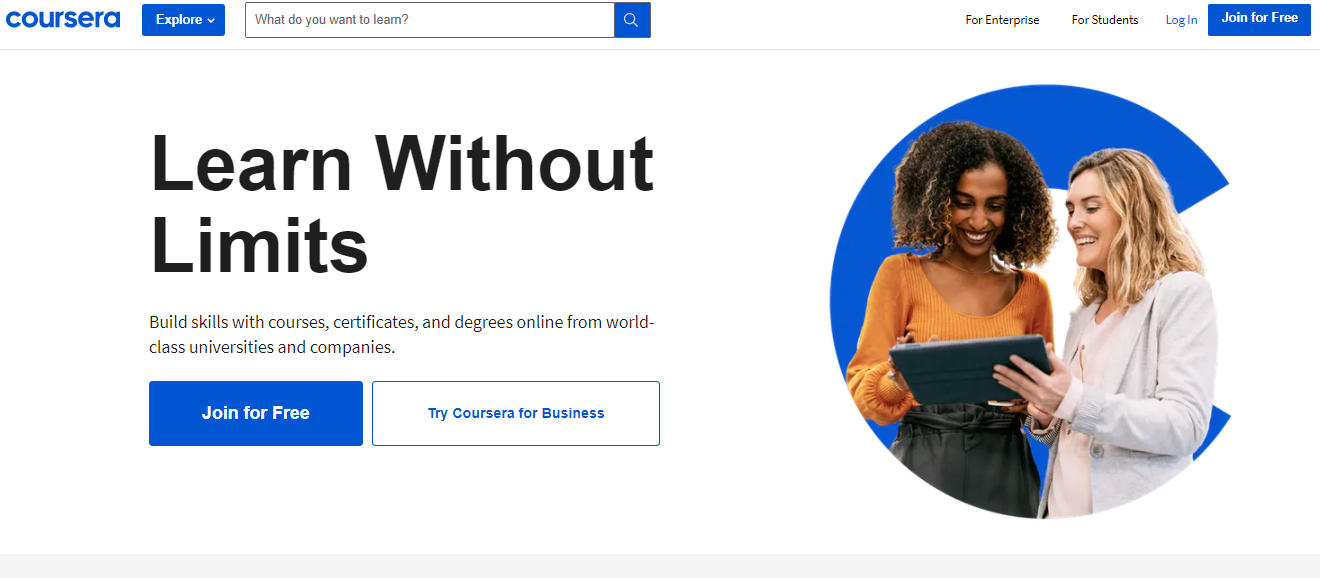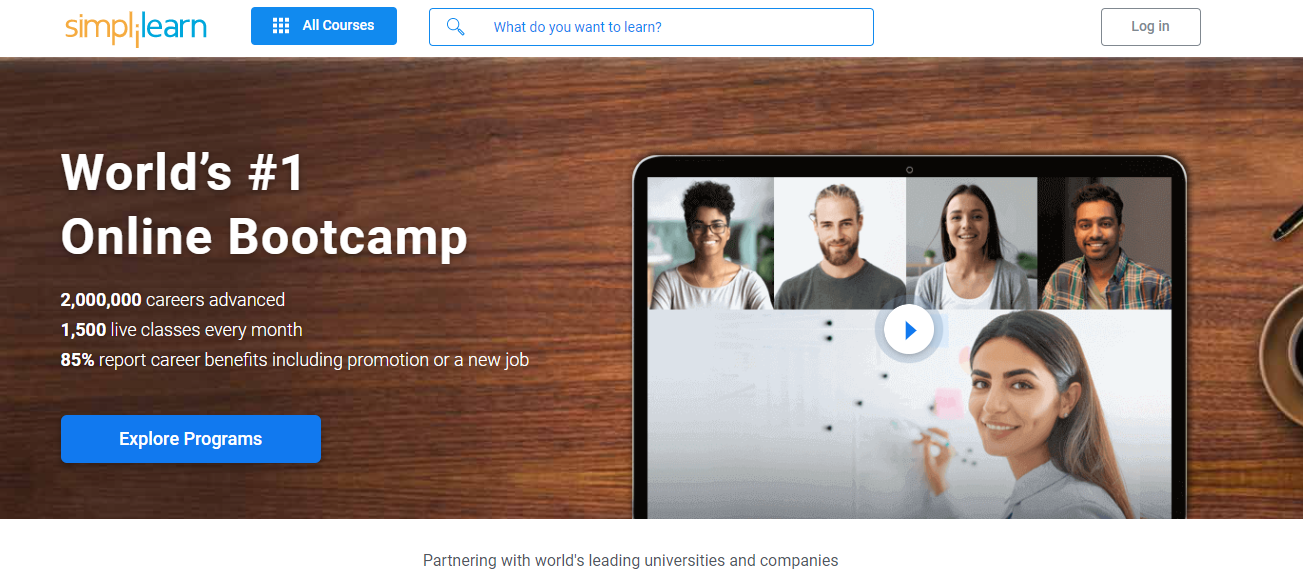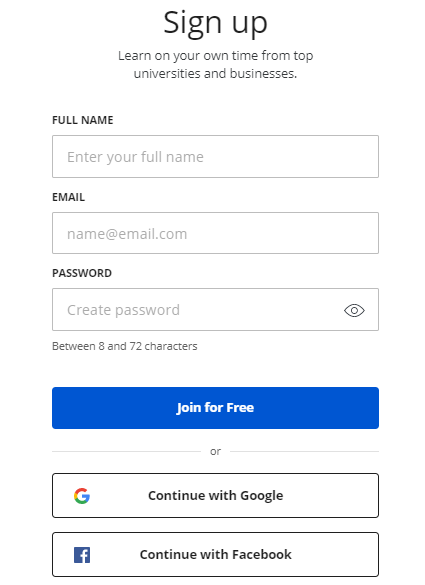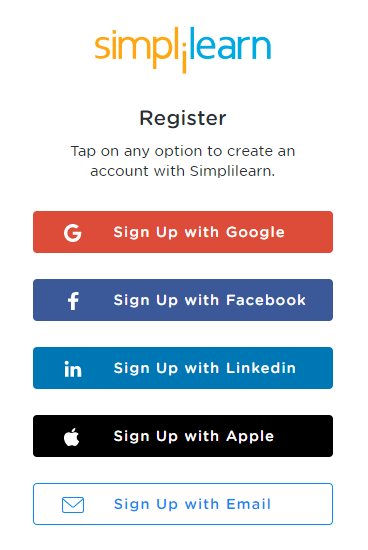Table of Contents
TLDR: Coursera vs Simplilearn
Coursera and Simplilearn are both accredited online learning platforms with plenty of programs to meet most learners’ needs.
Coursera’s courses cover a variety of topics and are more affordable, making it a better choice for learners on a budget. Simplilearn, on the other hand, focuses more on business and technology courses.
Then there’s the qualifications. Both Coursera and Simplilearn have partnered with leading colleges, universities, and organizations to bring you accredited qualifications that will stand out on your resume.
These are the basics you need to know. If you’d like more details, keep reading our comprehensive Coursera vs Simplilearn review.
Coursera vs Simplilearn: Who Is It For?
Coursera

Coursera caters to a wider audience. It’s suitable for students and professionals of all levels and backgrounds. The platform’s partnership with some of the world’s top universities and organizations makes it a viable option for professional degrees and more serious learning in general. So whether you’re up for a Master’s Degree in Cybersecurity or a short, beginner-level SEO course, Coursera has you covered. It also offers more than just business and technology courses.
Simplilearn

Simplilearn is an online learning platform that caters to learners who are specifically interested in business and technology-related topics. Unlike Coursera, there are very few free and casual courses to choose from. Instead, Simplilearn programs require dedication and active participation, like the MasterTrack and Degrees programs on Coursera.
Coursera vs Simplilearn: Types of Courses Offered
Coursera
Coursera has a giant library of courses (currently more than 4,000) divided into 11 categories:
- Business
- Data Science
- Computer Science
- Language Learning
- Health
- Information Technology
- Personal Development
- Social Sciences
- Math and Logic
- Physical Science and Engineering
- Art and Humanities
Each category additionally branches into subcategories for added convenience when browsing.

There are also several types of course structures and qualifications to choose from on Coursera:
- Guided Projects. Guided projects are short courses on a particular topic taught by industry experts. Most of the projects take less than three hours to complete. The main goal is to pass on practical knowledge and then test these skills.
- Specializations. Specializations are in-depth programs focusing on a particular topic and consist of four or more courses. Each course is oriented towards a subtopic that together, forms an organized specialization that helps learners master one skill.
- Professional Certificates. Professional certificates are special programs that prepare freshly graduated students or entry-level employees for industry-specific roles. Some of Coursera’s professional certification programs are accepted by organizations and schools worldwide.
- Degrees. Learners interested in getting their graduate degree remotely can sign up for one of the many degree programs offered by Coursera. The platform partners with popular universities, like Princeton or Yale, to offer a robust, college-level learning experience.
- MasterTrack Certificates. MasterTrack is a special module for students who wish to get a master’s degree from one of the partner universities. Much like the degree programs, a masters can take from one to three years to finish, so it’s more geared toward serious learners who would like to explore postgraduate distance learning options.
Is Coursera Accredited?
The platform’s MasterTrack and degrees programs are all accredited and will count toward college credits. However, note that regular courses, guided projects, and most programs available with the Coursera Plus subscription aren’t accredited. Employers or organizations may not accept those certificates as proof of education.
Simplilearn
Most of the programs offered on Simplilearn are focused on business and technology. There are no music, art, or design programs, like at Coursera. Their courses cover 13 categories, including:
- Data Science and Business Analytics
- AI and Machine Learning
- Project Management
- Cybersecurity
- Cloud Computing
- DevOps
- Business and Leadership
- Quality Management
- Software Development
- Agile and Scrum
- IT Service and Architecture
- Digital Marketing
- Big Data
As you can see, Simplilearn mainly focuses on very narrow fields. Each category further splits into subcategories.

The platform lets you choose from short-paced to postgraduate and masters university programs. Much like Coursera, Simplilearn also collaborates with some of the best-known universities like Purdue University and the University of Massachusetts.
Is Simplilearn Legit?
Yes, Simplilearn courses made in partnership with universities are fully legitimate and accredited. You can earn points toward college or get a real masters or undergraduate degree in your field of interest.
Coursera vs Simplilearn: Pricing and Refunds
Coursera
Coursera prices depend on the type of course you’re after. For example, a Guided Project or a regular class can start from $9.99. A MasterTrack program, on the other hand, can cost more than $40,000.
If you want to try Coursera before you pay, the great news is that the platform offers over 2,000 free courses in most categories. Learners can take the courses for free and then upgrade to the paid plan if they wish to receive a Coursera certificate of completion.
The Coursera Plus program costs $399 per year, and it’s the most convenient plan for learners who want to invest in their knowledge and skills over the long term – monthly payments are also available. Whichever option you choose, there’s a 7-day free trial so you can test the platform and see whether the courses work for you.
Professional Certificate programs start from $39 per month. You can expect to pay this fee for at least six months since that is the average duration of a certificate course.
The bachelors programs cost between $9,000 and $50,000+ for one or more years of study.
As far as a MasterTrack program is concerned, costs start from $2,000 for an average of seven months. The reason for the higher price is that you get a university qualification as well as college credit.
Refunds
Whether you’re eligible for a refund or not depends on the type of program you’re in.
- Coursera Plus – 14-day refund (after the payment)
- Specializations – no refunds after the free trial
- Guided Projects – no refunds
Simplilearn
Most Simplilearn courses range from $600 to $3,000. The price depends on the course duration, type, and the educational institution involved. An average course will have different pricing tiers depending on your needs. For example, a basic machine learning course had the following price structure:
- Self-paced learning – $965
- Online boot camp – $1,069
- Corporate training – price on demand
Self-paced learning programs are the most affordable. They also offer lifetime access and support.
Online boot camps are more comprehensive and focus on building the skills you need fast. You can expect more intensive classes. Also, boot camps start and end on specific dates, so they aren’t as flexible as the self-paced programs.
Corporate training is suited for managers that need to enhance the skills of their teams. They can choose between self-paced and blended learning (a combination of self-paced and instructor-led), which is why the price can vary.
You can also try some Simplilearn free courses on their SkillUp program.
Refunds
Simplilearn offers different refund policies for different programs. For self-paced learning, you can request a refund no more than seven days after purchase. If you already went over more than 25% of the content or downloaded some of the materials (eBooks), you may not be eligible for the refund.
Instructor-led training has the same policy as self-paced programs, with the addition of the situation where the student has already attended online classrooms or accessed recordings for more than one day. If so, they won’t be eligible for the refund.
For postgraduate programs, you can request a refund within seven days of purchase.
Learners can initiate a refund request from their orders section or through the support team (if they want to get a refund for more than one item).
Coursera vs Simplilearn: Enrollment and Usability
Coursera
First-time Coursera users will have an easy time navigating the platform and creating a profile. You can sign up using your Facebook or Google account or enter your email and personal information.

The platform doesn’t require you to insert a credit card number at registration (important to know!), so you don’t have to worry about any initial charges.
When it comes to browsing for courses, the website is clearly organized so you can focus on the specific learning path you’re interested in. There’s also a search button for fast browsing.
Once you’re on a course page, you can see information such as course duration, syllabus, and certificate information, as well as whether the content is suitable for beginners, intermediate, or advanced learners.
If you take a course for free, you have to purchase the course to qualify for a certificate.
Simplilearn
Simplilearn is equally straightforward. You can sign up using your email or social media account, and you don’t have to insert your credit card number either.

Using the top-left corner menu, you can explore different course categories offered on the platform. Simply click on the option you’re interested in and the system will filter out different programs (self-paced, university, etc.) available under that topic.
Every course page is detailed so you can know exactly what’s expected of you and what you’ll learn.
The Eligibility section explains which levels and roles are best suited to a particular course.
The Pre-Requisites paragraph will clearly state whether you need to have a college degree or any other type of diploma to register for the course.
And in the Course Content section, you can see details about every lesson.
Coursera vs Simplilearn: Course Structures
Coursera
Most Coursera courses (except for some Guided Projects) consist of prerecorded video lessons. Many courses will have a specific start date and suggested study timeline, so it’s best to stick to it in order to get the most out of the course.

You’ll also be able to post in the community forum and get to hear from your classmates, exchange opinions, and get help on a particular subject. If you post outside of the timeline dates, you’re less likely to get a prompt response.
Coursera classes consist of the following materials:
- Online lectures – mostly prerecorded videos
- Quizzes – present throughout video lectures
- Projects – auto-graded or peer-reviewed assignments
- Discussions – forum discussions
- Downloadable resources – reading material for offline learning
Most Coursera courses are available on mobile and desktop.
Simplilearn
Simplilearn courses require attention, dedication, and commitment on behalf of students. Depending on the plan, students may be required to follow online instructor-led lessons at a specific time of the day. Also, there are more hands-on projects they have to complete to get a certificate. The instructors will grade the assignments much like any other educational institution and its professors would do.

Simplilearn courses are very interactive. The level of intensity depends on the course type. For example, you can expect quite an intensive learning experience during the online boot camps or masters programs.
Other than the video lectures (prerecorded or live), Simplilearn courses also include graded assignments, quizzes, and downloadable materials for offline studying.
The Verdict
Both Coursera and Simplilearn are excellent platforms for online learning. The one that is best for you depends on your learning needs. Both websites offer accredited college degree (bachelor’s and master’s) programs from some of the world’s top universities.
However, Simplilearn only specializes in the fields of business and technology. So if you’re after a social science degree, go for Coursera. Also, Coursera offers more casual courses you can follow to hone your skills in a particular topic without putting in much focus and effort. Simplilearn, on the other hand, requires your full attention and dedication.
So if you’re after a degree or serious online boot camp program in any business or tech-related field and you have the budget for it, Simplilearn is your best option. And if you’re after a professional learning experience in any other field or prefer to spend less than $100 on a course, give Coursera a try.
We hope this in-depth Coursera vs Simplilearn review has helped you understand which platform suits your particular learning requirements. Happy learning!
